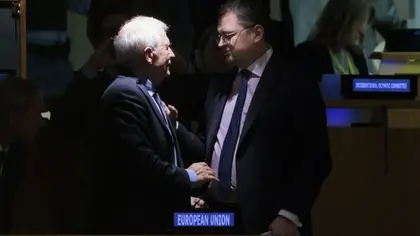The EU has put together a framework document, based on the bloc’s existing and ongoing efforts, to give Ukraine lasting security commitments, according to a draft by the bloc’s diplomatic service (EEAS), seen by Euractiv.
The draft document, dated 8 April, lists the EU’s existing and ongoing efforts, ranging from political, military, and financial assistance to commitment to drive forward Kyiv’s accession process.
JOIN US ON TELEGRAM
Follow our coverage of the war on the @Kyivpost_official.
“The European Union and Ukraine agree that the European Union’s security commitments to Ukraine will remain in effect as Ukraine pursues its European path,” the draft document states.
Eight countries—the UK, France, Germany, Denmark, Canada, Italy, the Netherlands, and Finland—have signed bilateral security deals with Ukraine so far as part of a wider Western effort to help the country combat Russia’s aggression.
Ukrainian officials expect more to be signed before summer, including with Romania and Poland.
The bilateral deals commit to the continued provision of military and security aid, support to develop Ukraine’s defence industrial base, training Ukrainian soldiers, intelligence sharing and cooperation, and support for cyber defence.
While falling well short of the mutual defence that would come with NATO membership, the deals would provide a stop-gap to reassure Ukraine of continued Western support.The EU’s security commitments and national bilateral security commitments arrangements concluded between the bloc’s member states and Ukraine “are complementary and mutually reinforcing”, the document states.

British Defence Intelligence Update Ukraine 23 December 2024
The EU will “facilitate coordination between member states of the European Union and cooperate with other partners on the implementation of respective security commitments”, it adds.
As with most national security deals to date, the draft document foresees the bloc to “review the European Union’s security commitments not later than ten years from the date of this statement”.
Contrary to some national security deals, the EU’s document does not list fresh commitments or pledges but references areas where support could be expanded.
The recently created Ukraine Assistance Fund — part of the EU’s off-budget European Peace Facility (EPF) used to partially reimburse member countries for the weapons they provide to Ukraine – will have a budget of €5 billion for 2024.
“Further comparable annual increases could be envisaged until 2027,” the document states, adding that needs “will be driven by the evolving needs of the Ukrainian Armed Forces and complementing EU Member States bilateral efforts”.
You can also highlight the text and press Ctrl + Enter






